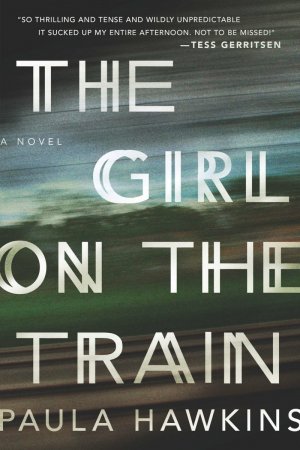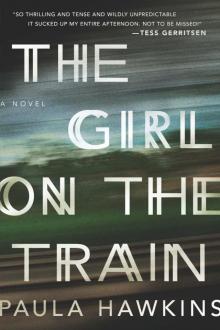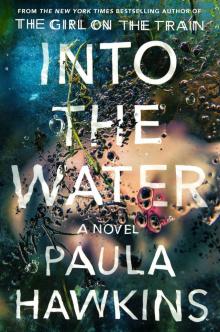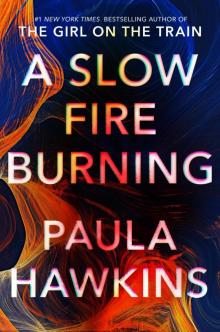- Home
- Paula Hawkins
A Slow Fire Burning Page 18
A Slow Fire Burning Read online
Page 18
“Twice,” he said quietly. “She asked to see me the second time, and I went. I couldn’t tell you, Cee . . . it was”—he exhaled hard—“just before she died. I went to see her and a week or so later she was found at the bottom of the stairs. It looked bad.”
“It looked bad,” Carla repeated. “And was it?” she asked, her voice soft. “Bad?”
“Cee . . .” He reached for her hand and she let him take it. “I don’t want to have this conversation here, do you? It’s Ben’s day. It’s his eighteenth. I don’t even want to think about her today.”
“Why did she ask to see you?” Carla asked. Theo didn’t answer. He leaned across toward her and kissed her on the mouth, and she let him.
“I’ve missed you,” he said. “I don’t like it when you disappear.”
They sat for a while in silence, hand in hand. Theo had brought cognac in a hip flask; they took turns sipping from it, passing it back and forth between them.
When the alcohol was burning hot in her chest, Carla asked him: “What would you do differently? If you could? Would you still marry me if you knew what was to come?”
“Of course I would, I—”
“I don’t think I’d have married you,” she said. Theo winced. She squeezed his hand, dropped it. “I don’t mean that to be cruel, but if I had known, I don’t think I could have. Only, I suppose it didn’t really matter who I married, did it? It might have happened anyway, mightn’t it?”
“What do you mean?” He took hold of her wrist, finger and thumb looping around the slender bone. With his other hand he reached out and touched her face; he tried to turn her chin so that she would face him, but she pulled away.
“The poison,” she said. “It came from me, from my family.”
“You are not your sister,” Theo replied.
Then, finally, she met his eye. “You should forgive her, Theo.”
* * *
Theo tried to get Carla to go home with him, but she insisted that she wanted to stay awhile. At first he offered to stay with her, but eventually she managed to persuade him to go. Though not before he’d handed over a USB drive with a draft of his latest novel for her to read. “Theo, really? I do have quite a lot going on at the moment, you know? I haven’t even—” Her voice caught. “I haven’t even done anything about the funeral. Daniel’s funeral, I need to . . .”
“I could do that,” Theo said, still pressing the USB stick into her hand. “I could make those arrangements, but . . . Cee. You’ve always been my first reader. You can’t just stop being my first reader; it doesn’t work like that.”
Carla watched him weave his way through the gravestones, a little the worse for the cognac, dappled sunlight picking him out as he made his way to the main road. She waited for a while, to make quite sure that he was gone, that he hadn’t turned back, wasn’t loitering somewhere keeping an eye on her, before she took from her pocket a handful of ash and sprinkled it over the grass covering Ben’s grave.
She tried to conjure up her sister’s lazy drawl, her throaty laugh.
* * *
• • •
“Do you remember that house in Vaugines, Cee?” Angela had asked her, years ago. They’d been sitting on the sofa in Angela’s living room in the house on Hayward’s Place, weak sun shining through half-closed curtains, illuminating the room with a dirty yellow glow. Angela sat with her feet tucked up underneath her; she was smoking, picking at her nails. Her hands were steady, which meant she’d already had a drink. “Do you remember that place, by the olive grove, with all those strange animal head sculptures on the walls? And Daniel and I stayed in the pool house? Ben was still a baby, he was tiny”—she held out her hands to demonstrate—“warm and perfect like a loaf of bread.”
“Of course I remember,” Carla said. “It was the first holiday we ever took him on. Theo and I spent all our time on those daybeds beneath the trees, falling asleep with him tucked in between us.” She closed her eyes. “What were those trees? Were they oak trees, do you think? Or maybe plane . . .”
“Those incredible sunsets,” Angela said. “Remember those? All that rosé.”
“And you couldn’t get Daniel out of the pool, not for love nor money. Do you remember how cross he got, because he wanted to teach Ben to swim and we kept telling him Ben was way too little?”
Angela shook her head. “Did he? Did he really?” she asked, bending forward to stub out her cigarette in the ashtray on the carpet. “It seems impossible, doesn’t it? Thinking about it now, from here”—she gestured at the ugly room around them—“that we were all so happy. It seems unimaginable. All that happiness, wrecked.”
Carla’s own hands shook; her arms, her legs, her whole body trembled as she rose to her feet, as she stared down at her sister, lamenting their lost contentment. “Unimaginable,” she croaked. “It is, isn’t it? Just a few moments of carelessness, an hour or two of unthinking neglect, a door left open. And here we are.”
She remembered the way her sister stared at her then, glassy-eyed, her mouth working but making no sound.
Carla took another handful of ash, and brought it to her lips before she pressed it down, into the earth.
The One Who Got Away
They skip school, slipping out through the gates unseen. There’s a bus to and from town, one an hour, on the half hour. Hurry up! Her friend hitches up her skirt, sprints ahead, waving frantically to attract the driver’s attention. The girl half jogs, book bag slung awkwardly over her shoulder, large breasts bouncing. They board the bus, pass the smirking driver, pass the other sour-faced passengers.
The moment they get off the bus, the girl regrets coming. It is baking hot, pavements crammed with shoppers. There’s nothing to do here, nowhere to go. Listlessly they drag their feet, shop to shop, they look at clothes they cannot afford, they buy cigarettes from the corner shop, cheap ones, rough on the back of the throat. They smoke, lighting one from another, until they feel sick.
They go to the pub, but the barman won’t serve them. They sit at a table outside, skirts hitched up. Sunning themselves. The old blokes sitting at the next table give them dirty looks. A younger man approaches, he looks at them, looks at the friend, not at the girl, he smiles. He is ugly, his eyes too close together, acne on his neck, red raw. Her friend rolls her eyes. As if, she says, and she laughs.
Music starts to play from somewhere, a radio, a jukebox, the girl has heard this one before, something slow, a man’s voice soft and hoarse over acoustic guitar. In the hot afternoon sun, the girl’s skin is cold. She feels as though someone has poured petrol all over her, and yet there is a point at the back of her scalp, right where her ponytail is secured, that throbs with a vicious heat.
Something bad is going to happen.
TWENTY-FIVE
The basin almost full, her hands plunged wrist-deep into warm, soapy water, Miriam experienced a flashback so pin-sharp she recoiled. It wasn’t visual but a sensation—the sudden, surprising heat of arterial blood bubbling up through her fingers, the shock, immediately afterward, of disappointment. Of sorrow. No taking it back. She stood at the sink in her tiny bathroom, her arms in the water, unable to move for a minute, perhaps even two. Her right hand squeezed a nail brush and her left gripped the handle of pair of scissors, as if in spasm.
And then the moment passed, her hands relaxed, and she came back to herself. She pulled the plug and watched the soapy water run out, she replaced the brush and the scissors on the little shelf beneath the mirror. Carefully, she dried her hands before tipping a little antiseptic lotion onto a ball of cotton wool, which she applied gently to the scratches on her neck and arms. She took the strips of adhesive bandage she’d cut from the roll and applied them to the worst of the wounds, along the side of her left forearm.
When she was finished, Miriam returned to the main cabin and began to tidy up. She replaced the books that had tumbled from th
e shelves, she put her wooden box back in its place, and with a dustpan and brush she swept up broken pottery and soil, one of her herb pots having fallen from the sill. The plant itself, a little spike of tarragon, was irredeemable. Back aching, knees pressed painfully into the cabin floor, she worked methodically, trying her best to sweep away all traces of her confrontation with that vicious girl. She was angry, but her fury was controlled, simmering, right up until the moment that she discovered, under the table, one of Lorraine’s gold hoop earrings, bent slightly out of shape, and she started to sob.
Why must people take what does not belong to them? Why must they take what is hers, and ruin it?
* * *
What Miriam remembered most vividly from the time immediately after her abduction was not the hospital. Not her mother, sobbing so hard she literally had to be propped up by Miriam’s father when they came to see her for the first time. Not the hours of interviews with the police, not the crowds of people camped outside their home, the journalists and the television cameras.
What she remembered most clearly was the unbearable kindness of Lorraine’s parents. Lorraine’s father, weeping when he came to her hospital room, squeezing her hand, murmuring, Thank God, thank God you’re all right.
Surely, Miriam thought, that cannot really be what he was thinking? Surely he must have been thinking: Why not you? Why wasn’t it you?
After Lorraine’s funeral, there was a wake at her parents’ home. Miriam asked if she could go upstairs, if she could spend some time in Lorraine’s bedroom, and Lorraine’s mother, this small broken woman, managed to smile at her. Of course you can, she said. You are always welcome here. You can visit anytime you like.
Upstairs, sitting at Lorraine’s dressing table, Miriam looked at all her friend’s brightly colored scrunchies, her lipsticks in dark pinks and reds, her eyeshadow palette in purple, blue, and white. There was a jewelry box in front of the mirror. It played “Greensleeves” when you opened it; Miriam had admired it since they were little girls. Inside the box there were necklaces and bracelets, a ring too small for Miriam’s fingers, and the earrings, the gold hoops, which she slipped into her jacket pocket. She left the wake without saying good-bye.
* * *
• • •
Three days later, Jeremy’s car was found in a car park on a cliff in an area euphemistically referred to as a beauty spot, one of those places people go when they have nowhere left to run. Three days after that, in very bad weather, the coast guard called off the search. And three weeks after that, two young children playing on a beach near Hastings came across a severed human foot that was the right size and color and contained blood of the right type. Whether dashed against rocks or chewed up in a boat’s propeller, Jeremy was gone for good, all that remained of him being the note he left in the glove compartment of his abandoned car, a note of apology, a single word, Sorry.
Sorry.
At school, everyone felt sorry for Miriam. Everyone felt sorry for her, and nobody wanted to be anywhere near her. Everyone looked at her and no one met her eye. Her name was on everyone’s lips and no one spoke to her at break time, at lunch. She walked past and they smiled, even the teachers, kindly, looking at some point in the middle distance, not at her. She was tainted. People—her parents, her grief counselor, the police—told her what had happened to Lorraine wasn’t her fault. No one would have expected you to do any different, Miriam. But the fact that they felt the need to say it told its own tale. The fact that they felt the need to say it meant that they had thought about it, they had thought, You might have done something else. No one would have expected you to. But you might have.
No one ever said that out loud, not until Theo Myerson came along.
The One Who Got Away
When he catches her, she knows what he is going to do to her. She has come full circle, this girl. Lying in the dirt, she sees herself as she was that morning, at her dressing table, brushing her hair, pulling it back into a ponytail that she secured tightly with a band at the nape of her neck.
Still innocent, then.
She could have stopped it, couldn’t she? She could, when her friend suggested skipping school, have simply shaken her head and walked ahead to double math. She could, when they were in town, have refused the pub and suggested the park. She could have said, I’m not getting in that car. She could have said it louder, don’t.
Even after it had all been set in motion, she could have done something different.
She didn’t have to run.
She might, instead of running, have selected a piece of glass from the debris lying on the yellowing grass outside the window she had shattered. She might have slipped this sliver into the pocket of her jeans. She might have crept back into the house, following the sounds of her friend’s distress. She might have slunk into the room where he held her, where he pinned her to the filthy floor. In bare feet she might have moved quickly, breath held. She might have grabbed hold of his hair, pulled his head back, and jammed the piece of glass into his throat.
But now it is too late.
TWENTY-SIX
Irene, dozing in her chair next to the window, a copy of Pat Barker’s Blow Your House Down open in her lap, was woken by the rain, a sudden downpour so heavy the raindrops drummed like hail against the flagstones in the lane outside, the sound of it so loud that Irene almost missed the sound of someone weeping.
She thought she’d imagined it at first, and then, rising to her feet, she thought with a sinking heart that it might be Carla—despairing, tragic Carla—back to haunt the house next door once more. But then she heard a knocking at her door, so soft, so tentative it might have been the work of a child. She heard a small voice call out, “Irene? Are you there?”
Laura, on her doorstep, soaked to the skin and in a dreadful state, her jacket torn and a livid bruise the size of a tennis ball marring the left side of her face. She was trembling, weeping like a little girl.
“Laura, good God! Come inside.” Irene reached for her, but Laura drew back.
“Don’t,” she sobbed. “You shouldn’t. You shouldn’t be kind to me.”
“What on earth are you talking about? Laura, for goodness’ sake.” She grabbed a handful of the girl’s sodden coat. “Come in, come out of the rain.”
In the darkened hallway, the door shut behind her, Laura shook herself like a dog. “You should turn me away,” she said miserably. “You should tell me to fuck off, not that you’d ever say that, because you’re too nice and polite.”
“Well, quite,” Irene said crossly. “Stop being silly. Take off that wet coat, put it on the radiator there. Hasn’t it got cold? I’ll turn the heating on. Now, come on, don’t dawdle, don’t drip. Come into the living room. I’m going to turn the heating on and then I’m going to get us a cup of tea. You can tell me all about it, you can start from the beginning.”
When she returned with the tea, Laura was sitting on the floor in the middle of the living room, her legs crossed and her head in her hands. Irene handed her a mug. “Come on, then. Let’s hear it. What’s going on?”
As Irene settled back into her armchair, Laura began. She said that she’d taken money from Irene’s purse, which Irene knew, of course, because although she was forgetful, she wasn’t a fool. Laura told her that she’d taken something from next door too, that she’d seen the door open and snatched a bag from the hallway, and Irene had not known about that. “Do you still have what you took?” she asked sternly, and the girl nodded. “Then you’ll give it back. Money is one thing, Laura, and I understand you’re in a tight spot. But you can’t take things that mean something to someone. Can you imagine how you’d feel,” she scolded, “if someone took William’s watch from me? Can you imagine what you’d think of that person?” Laura cringed in shame. Her expression forlorn, she tipped the contents of her backpack onto Irene’s living room floor, picked up the two little jewelry boxes, and handed
them to Irene.
“That’s not the worst of it,” she said, her voice barely more than a whisper. In her chest, Irene’s heart quailed. She dreaded what Laura was about to tell her, for what could be worse? What could be worse than stealing from a grieving woman?
“What have you done, Laura?” Her breath catching, she could barely utter the words. “You’ve not . . . you haven’t hurt someone, have you?”
Laura looked up, eyes bright. “I don’t think so. Unless you count the guy with the fork, but I don’t think that’s what you mean, is it?” Irene shook her head, confused. “Daniel,” Laura said, and Irene’s hand flew to her mouth.
“Oh no, Laura.” Irene felt her heart might stop.
“I didn’t kill him!” Laura cried. She was on her knees, at Irene’s feet. “I didn’t, I swear. But I was there. . . . Just before, I was there with him. And I didn’t tell you, because you said he was trouble, you—”
“I didn’t say he was trouble, Laura. I said he was troubled. I think I warned you to be careful with him, because he was a troubled boy, didn’t I? He had a difficult family life, I told you that, I—”
“And I didn’t listen. And I went with him, and I spent the night. . . .” Laura tailed off. Outside, the rain had abated somewhat but the sky was darkening as if in preparation for a second assault.
“You stayed the night?” Irene repeated, and Laura looked down at the carpet. “Oh, for God’s sake!” she snapped. “There’s no need to be so coy. I’m an old woman, not a child.” Laura nodded, but she didn’t raise her eyes. “So, you spent the night with him. And then you left without any breakfast, I’m guessing. But he was fine when you left him?” Laura nodded again. “And you’ve no idea what happened to him?” Laura shook her head this time. “Laura! Did you honestly think, in the light of all that, that it was really a good idea to go stealing from his family? For God’s sake. Imagine how it would look, if someone found out, if—”

 Girl on the Train
Girl on the Train The Girl on the Train
The Girl on the Train Into the Water
Into the Water A Slow Fire Burning
A Slow Fire Burning